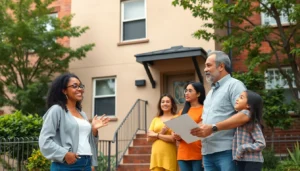Table of Contents
ToggleFinding affordable housing can feel like searching for a unicorn in a haystack, especially in Georgia’s bustling cities. But fear not! Income-based apartments are here to save the day, offering a budget-friendly solution for those navigating the housing jungle. These gems provide a roof over your head without emptying your wallet, making them a popular choice for many.
Understanding Income Based Apartments in Georgia
Income-based apartments serve as a vital option for individuals seeking affordable housing in Georgia. These residences offer lower rent costs based on a tenant’s income level, ensuring that housing remains accessible to those who qualify.
Definition and Purpose
Income-based apartments aim to provide safe and affordable housing for low to moderate-income families and individuals. These apartments adjust rent amounts according to income specifics, allowing residents to allocate more resources towards essential needs. Many of these units exist within federally assisted programs, ensuring they meet certain quality standards. By promoting affordability, they help alleviate housing instability and improve living conditions for those in financial need.
Eligibility Criteria
Qualifying for an income-based apartment usually depends on household income and family size. Most programs require applicants to earn less than a specific percentage of the median income in their area, often between 30% and 80%. Applicants must also provide proof of income, residency, and other relevant documents. Additionally, some programs perform background checks to ensure a safe community environment. Applicants should explore local resources to learn about specific eligibility conditions for different income-based housing options.
Types of Income Based Apartments in Georgia

Income-based apartments in Georgia come in several forms, offering diverse options to accommodate varying needs.
Public Housing
Public housing programs provide affordable apartments owned and managed by local housing authorities. Eligibility hinges on income level, with most applicants required to earn less than 80% of the area median income. Residents benefit from reduced rent rates based on income and family size. These communities often include amenities such as playgrounds and onsite maintenance services, enhancing the living experience. Access to public housing may involve a waiting list due to high demand, particularly in urban areas.
Section 8 Housing Choice Vouchers
Section 8 housing choice vouchers enable low-income families to rent privately owned apartments. This program runs through the U.S. Department of Housing and Urban Development. Successful applicants receive rent assistance, covering a portion of the rent based on their income. Participants can select from various housing options, allowing them more flexibility in choosing their living situations. While eligible households typically earn no more than 50% of the area median income, the assistance promotes stability and community integration.
Finding Income Based Apartments in Georgia
Finding income-based apartments in Georgia involves utilizing various resources to simplify the search process. These apartments cater to individuals and families needing financial assistance, ensuring safe housing options are accessible.
Online Resources
Online platforms serve as valuable tools for locating income-based apartments. Websites like GoSection8.com and AffordableHousing.com list available units across Georgia. Users can filter properties based on income criteria, location, and amenities. Additionally, many sites offer application processes and eligibility requirements, making it easier to navigate housing options. Social media groups and community forums can provide insights from current residents about their experiences. Internet searches can also reveal local non-profits assisting with housing needs.
Local Housing Authorities
Local housing authorities in Georgia play a significant role in providing income-based apartment resources. These agencies oversee public housing programs and administer Section 8 vouchers within their jurisdictions. Individuals can contact their local authority for information on application procedures and eligibility criteria. Each authority maintains a waiting list for housing opportunities due to high demand. Often, they offer additional resources, including referrals to nearby rental assistance programs or supportive services. Engaging with housing authorities can lead to more personalized assistance in finding affordable options.
Benefits of Income Based Apartments
Income-based apartments in Georgia offer several key advantages for individuals and families seeking affordable housing options. These benefits include affordability and community support.
Affordability
Affordability stands out as a primary benefit of income-based apartments. Rent costs adjust to reflect tenants’ income levels, making housing accessible to low and moderate-income individuals. Many programs require applicants to earn less than 80% of the median income for their area. This prevents financial strain, allowing families to allocate funds toward essential needs such as food, healthcare, and education. Lower rent payments help foster household stability and reduce the risk of eviction.
Community Support
Community support is another significant aspect of income-based apartments. Residents often benefit from on-site amenities such as playgrounds and community centers, promoting social interaction and engagement. Many local housing authorities provide outreach programs that connect tenants with job training, financial literacy classes, and other essential services. Such programs enhance community ties and offer residents resources to improve their quality of life. Living in these communities fosters a sense of belonging while encouraging collaboration among neighbors, ultimately creating a supportive environment.
Challenges and Considerations
Several challenges exist in the search for income-based apartments in Georgia. Navigating the application process can pose obstacles for many applicants.
Application Process
Completing the application for income-based apartments requires careful attention. Applicants must gather necessary documentation, including proof of income, identification, and rental history. Each property may impose unique requirements, so verifying specific criteria becomes essential. Background checks often occur to ensure safety within the community. Successful applications typically depend on meeting income limits set by individual programs, which often require families to earn below a certain percentage of the area median income.
Waiting Lists
Due to high demand, waiting lists frequently accompany income-based apartment options. Applicants may experience extended wait times, sometimes stretching several months or even years before receiving an offer. This situation arises from limited available units despite the pressing need for affordable housing. Applicants often face uncertainty regarding their position on the waiting list, making it vital to remain proactive. Regularly checking in with local housing authorities can provide updates and insights on the waiting process.
Finding affordable housing in Georgia doesn’t have to be an overwhelming task. Income-based apartments offer a viable solution for those struggling to secure a home within their budget. With rent adjusted according to income levels, these options provide a pathway to stability for low and moderate-income families.
Utilizing available resources like online platforms and local housing authorities can simplify the search process. While challenges such as waiting lists and application requirements exist, staying informed and proactive can help applicants navigate these hurdles. Ultimately, income-based apartments not only foster financial relief but also promote a sense of community, making them a crucial part of Georgia’s housing landscape.







